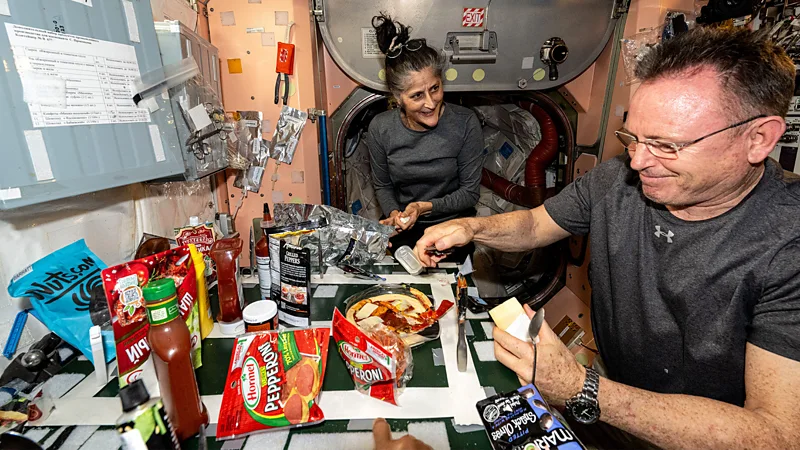International
Leave only moonprints: Nasa’s lunar recycling ambitions

When astronauts land on the Moon again as part of the Artemis project, they will have to build a place to live in. Nasa wants them to build as much of it they can from used materials.
When the first men landed on the Moon in 1969, sustainability was the least of their concerns. To save weight before they headed home the Apollo astronauts tossed anything they didn’t need out of the door of the lunar lander, leaving the landing sites littered with debris.
Nasa’s official tally of what the 12 Moonwalkers left behind includes 96 bags of urine, faeces and vomit, as well as boots and life support systems. The astronauts discarded three lunar rovers, assorted experiments and cameras, six flags, a family photo, a feather and two golf balls – hit “miles and miles” by Apollo 14 commander Alan Shepard. The list also includes one hundred $2 bills (£1.58) – rare enough on Earth but now arguably the most valuable Earth currency in the Universe. Don’t trade your Bitcoin in just yet, though, as the ink on the banknotes may have faded to nothing in the harsh UV rays of the Sun.
“There’s no erosion, there are no dust storms that will cover them up or hide them,” says Chris Impey, a professor of astronomy at the University of Arizona and an expert on space junk. “They are there forever.”
For historic missions like Apollo that is not really a problem. Neil Armstrong’s first footsteps on the lunar surface mark arguably one of the greatest achievements of humanity and the challenge for the US will be to preserve the landing sites in their original state – from footsteps and Moon buggies, to golf balls and excrement bags.
International
FTX executives shave serious time off their sentences

Ryan Salame and Caroline Ellison, FTX executives convicted for their roles in the notorious crypto fraud led by their former boss Sam Bankman-Fried, have both shaved time off their lengthy prison sentences.
Salame, a former top executive of FTX, the now-bankrupt cryptocurrency trading platform, pleaded guilty to criminal fraud charges in September 2023, and was sentenced in May to 7 1/2 years in federal prison. He began his sentence in October. But the Federal Bureau of Prisons currently lists his release date as March 1, 2031, more than a year earlier than his initial release date in April 2032. Business Insider first reported Salame’s new release date.
Ellison, Bankman-Fried’s former girlfriend and the former CEO of FTX’s hedge fund arm, Alameda Research, was sentenced to 2 years in prison after she pleaded guilty to seven federal counts of fraud and conspiracy and was a key witness against Bankman-Fried. Her current release date is listed as July 20, 2025, three months earlier than her initial release date.
Bankman-Fried, who was sentenced to 25 years in prison, does not have a release date listed on the prisons website.
The Bureau of Prisons didn’t immediately respond to CNN’s request for comment. However, in several past statements about early release dates, the bureau has told CNN that it does not comment on the conditions of any individual inmate, but inmates can earn good conduct time that is calculated into their projected release date.
Qualified inmates are currently eligible for up to 54 days of GCT time for each year of the sentence imposed by the court. Inmates have other ways of earning time credits while incarcerated, including participation in various prison programs.
FTX was a high-profile crypto startup that allowed people to buy and sell digital assets. It had its name emblazoned on an arena in Miami and on every Major League Baseball umpire’s jersey. The exchange had several celebrity endorsers and was widely believed to be a gold-standard for safety and security.
But FTX collapsed in November 2022 when customers pulled their funds as rumors spread about FTX’s unusually close ties to its founder’s crypto hedge fund, Alameda
International
Accusations of genocide. Charges of corruption. Improbably, Netanyahu had a good year

This time last year, Israeli Prime Minister Benjamin Netanyahu was in the doldrums.
“He started very low,” said Nadav Shtrauchler, a political strategist who has worked closely with Netanyahu. “The lowest point that he had.”
Many Israelis accused him of being asleep at the wheel on October 7, the deadliest attack on Jews since the Holocaust. Some even said he enabled it by funding Hamas.
His political support was dismal – even if the Gaza war let him brush aside calls for an election. Polls suggested support for his Likud Party was down 25% from just three months prior.
On its face, the year that followed was hardly uplifting. It brought tens of thousands of deaths, regional conflict, indictments, and accusations of ethnic cleansing and genocide. And yet, Netanyahu ends the year having transformed his standing in Israel.
“I am running a marathon,” he told a Tel Aviv courtroom earlier this month, facing charges – which he denies – of bribery, fraud, and breach of trust. “I can run it with 20 kilos on my back, and I can run it with 10 kilos on my back.”
International
‘It’s a scary time’: US universities urge international students to return to campus before Trump inauguration

Fear and uncertainty are spreading across many US college campuses ahead of President-elect Donald Trump’s January 20 inauguration, with some schools advising international students to return early from winter break amid promises of another travel ban like the one that stranded students abroad at the start of Trump’s last term.
In a country where more than 1.1 million international students enrolled in US colleges and universities during the 2023-24 academic year, the former president has pledged more hardline immigration policies upon his return to the White House, including an expansion of his previous travel ban on people from predominantly Muslim countries and the revocation of student visas of “radical anti-American and antisemitic foreigners.”
International students generally have nonimmigrant visas that allow them to study in the US but don’t provide a legal pathway to stay in the country.
-

 Entertainment4 months ago
Entertainment4 months agoEarthquake scientists are learning warning signs of ‘The Big One.’ When should they tell the public?
-

 International4 months ago
International4 months agoTarar accuses Imran Khan of conspiring with Faiz Hameed to destabilise Pakistan
-

 International2 months ago
International2 months agoPTI Announces Not to Boycott New Committees
-

 Business3 months ago
Business3 months agoMajor Corruption Scandal Uncovered at WASA Multan: Rs1.5 Billion Embezzlement Exposed
-

 Business4 months ago
Business4 months agoThe Impact of QR Codes on Traditional Advertising
-

 Business4 months ago
Business4 months agoThe Benefits and Problems of International Trade in the Context of Global Crisis
-

 Business4 months ago
Business4 months agoFraud by Pakistani Firm Sparks Outrage in Business Community; Concerns Rise Over International Investment
-

 Business2 months ago
Business2 months agoHigh Court Blocks MDCAT Merit List Amid Controversy Over Exam Error






